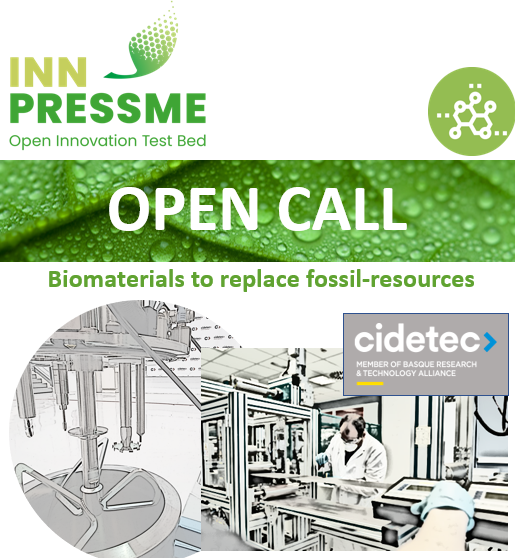
CIDETEC Surface Engineering invites you to participate in this Open Call, open until January 30.
Are you interested in funding projects under the premise of "Biomaterials instead of plastic"? CIDETEC Surface Engineering offers the opportunity to participate in the OpenCall that seeks to subsidize projects linked to this line of innovation. A dozen projects will be selected, which will receive up to 70% of aid from the European project Inn-Pressme, in which CIDETEC participates. The call will remain open until 30 January 2023 and has a budget of 1.6 million euros.
Services valued between 50,000 and 100,000 euros will be subsidized, an amount that will be defined during the negotiation of the delivery of the service for the selected cases. The proposed projects will have access to pilot lines with cutting-edge technologies to bring innovation to the biomaterials sector.
You can apply here: https://www.inn-pressme.eu/open-calls/
About INN-PRESSME:
INN-PRESSME Open Innovation Test Bed is providing European companies with technical and market-oriented services such as eco-design and circular economy assessment, characterisation and nanosafety studies, support for funding, and product certification advice. INN- PRESSME works to configure an OITB that helps companies in the world of nanotechnologies and biomaterials to move from a laboratory scale to a pre-industrial scale, achieving an increase in the circularity and sustainability of these materials that allows, in turn, increase consumption and market acceptance. The project, coordinated by VTT (Technical Research Centre of Finland), with the participation of CIDETEC in different pilots, brings together 27 collaborators from all over Europe. Some of the objectives that the project aims to solve are:
•-Obtain sustainable and reliable raw materials to feed existing and new value chains.
• -Optimize the conversion, formulation and processing of biomaterials.
• -Improve dispersion and stabilization of nanoparticles for homogeneous materials.
• -Reduce the time required for the certification of new biomaterials and nanotechnology products and facilitate their entry into the market by developing existing and new supply chains.
• -Addressing (nano) safety, health and environmental issues
• -Provide life cycle assessments and techno-economic analysis.
• -Facilitate SMEs' access, training and logistics to new nano-biomaterials through cost-effective and versatile open access facilities to enable expansion, with data exchange platforms.
• -Raise awareness among industry and consumers about the benefits of bio-based nanotechnology products.